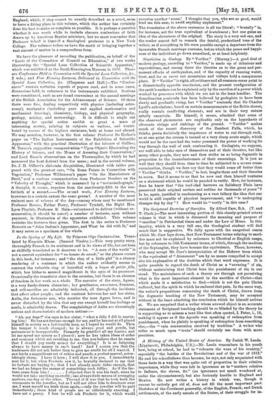We have the pleasure of recording the publication, on behalf
of the "Lords of the Committee of Council on Education," of two works illustrating the "Special Loan Collection of Scientific Apparatus," which was exhibited at the South Kensington Museum in 187C. These are Conferences field in Connection with the Special Loan Collection, 4-c., 2 vols.; and Free Evening Lectures, Delivered in Connection with the Special Loan Collection, 4-c. (Chapman and Hall.)‚ÄĒThe "Confer- ences" contain verbatim reports of papers read, and in some cases, discussions hold, in reference to the instruments exhibited. Sections were constituted, such as are found convenient at the annual meetings of the British Association for the Advancement of Science. Of these there were five, dealing respectively with physics (including astro- nomy), mechanics (including pure and applied mathematics and mechanical drawing), chemistry, biology, and physical geography,
geology, mining, and meteorology. It is difficult to single out anything for special notice amidst so great a mass of interesting matter, relating to subjects so various, and contri- buted by savans of the highest eminence, both at home and abroad. We may mention, however, in the first volume Professor De Eccher's paper on "The Italian Instruments of the Exhibition of Scientific Apparatus," with the practical illustration of the labours of Galileo ; M. Tresca's suggestive communication "Upon Objects Illustrating the History of Science, and the Means of Assuring their Conservation ;" and Lord Rosse's observations on the Thermopiles, by which he had measured the heat derived from the moon ; and in the second volume, Dr. J. H. Gilbert's elaborate disquisition, illustrated with tables pre- pared with the greatest care, "On Some Points in Connection with Vegetation," Professor Williamson's paper "On the Manufacture of Steel," and a curious communication from Professor Ponders on the "Velocity of Thought," which is measured by a " nofimotachograph." A thought, it seems, requires from the one-twenty-fifth to the one- fortieth of a second.‚ÄĒThe second work, Free Evening Lectures, traverses to a certain extent the same ground. A number of the most eminent men of science of the day‚ÄĒamong whom may be mentioned Professor Roscoe, Father Perry, Professor Tyndall, the Right Hon. Lyon Playfair, Professor R. Main‚ÄĒvolunteered to deliver (without re- muneration, it should be noted) a number of lectures, open without payment, in illustration of the apparatus exhibited. This volume contains the lectures thus given. The first in the series is Professor Roscoe's on "John Dalton's Apparatus, and What he did with It," and it may serve as a specimen of the whole.


































 Previous page
Previous page